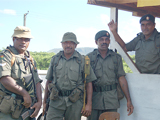Exporting Fijian Forces
By Jody Ray Bennett for ISN
New Zealand’s prime minister on 15 April once again expressed vocal opposition to the United Nation’s continued mobilization of Fijian soldiers for international peacekeeping missions since the coup that afforded the Fijian military total control of the island in 2006.
The government of New Zealand external pagecomplainedcall_made that the UN was essentially “propping up” the regime by funding the country while using its soldiers in various security operations around the world.
New Zealand’s Green Party later weighed in, stating that, "It is deeply ironic that Fiji is involved in rebuilding Iraq. Fiji's military is more about destroying democracy than restoring it." At the time, the majority of Fijian forces that were being used by the UN could be found in Iraq, with numbers totaling to 223.
According to the most recent UN external pageMonthly Survey of Contributorscall_made, the remainder of its Fijian forces are scattered as follows: 12 police personnel for the UN African Union Mission in Darfur (UNAMID); 32 police personnel for the UN Mission in Liberia (UNMIL); eight police personnel and seven military observers for the UN Mission in Sudan (UNMIS); and one military observer for the UN Integrated Mission in East Timor (UNMIT), totaling to 282 Fijian units for the UN.
By the end of April, while the Fijian military government was busy cracking down on an opposition political party for distributing pamphlets to the public, Australia and New Zealand had successfully external pagelobbiedcall_made the UN “to ban future deployments of the well-trained and well-regarded [Fijian] troops as a means of denying Fiji's flagging economy precious income from lucrative UN paychecks.”
Following a more than three-year struggle, the UN external pageagreedcall_made to bar the use of Fijian troops in further peacekeeping missions in response to the government’s moves to “suspend the constitution, compromise the independence of judges and censor the press.”
While countries like Australia and New Zealand are calling for a total ban on the use of Fijian military personnel abroad, forces that were deployed before the ban are still in operation.
The Fiji-Iraq complex
Unmentioned in the narrative of Fiji’s blacklisting by the UN are the thousands of Fijian civilians who are employed by private contractors as everything from dishwashers to drivers, mechanics to private security officers.
According to the 2006 external pagereportcall_madeFiji, the war in Iraq, and the privatisation of Pacific island security, “Fiji's economy is increasingly reliant on remittances from citizens working overseas. Personal remittances now run to more than F$200 million a year (approximately €6.8. million, earning more than traditional sectors like sugar and garment manufacturing.”
The report notes that Fijian military recruitment is a growing source of revenue and that “By mid-2005, there were over 1,000 Fijians working in Iraq and Kuwait, as soldiers, security guards, drivers and laborers. Even though some have been sent home in disgrace, and other returning troops have complained about the failure to obtain the promised benefits and welfare payments to families, more people are signing up for work in the Middle East.”
As such, the latest ban by the UN will now provide private companies with a surplus of unemployed Fijian soldiers who may reenter the Iraqi theater or elsewhere as private security personnel. If this occurs, it will demonstrate yet another instance in which private enterprise trumps an international regulatory organization by providing an alternative pathway for troops that would otherwise be blacklisted.
Before 2006, Global Risks Strategies external pageestablishedcall_made an office in Fiji and external pagerecruitedcall_made over 500 former and serving Fijian Military Force personnel “to travel to Iraq and provide security for oil fields, installations and government buildings.” Other companies like Homeland Security Limited sought approximately 200 Fijian military personnel to work in Iraq as well as Triple Canopy, which recruited at least 70 Fijians for Iraq as early as 2006.
But Fijians have been providing more than private security in Iraq. The latest report from Pratap Chatterjee, the investigative journalist who has external pagedevotedcall_made his life to uncovering the illicit activities of global corporations, has illustrated the history of Fijian employment by large American logistics contractors in Iraq like KBR, who external pagehirecall_made Fijian civilians to drive unprotected trucks through heightened alert zones and fail to provide adequate residence facilities for workers who are often forced to sleep in their trucks.
Back in 2007, Bloomberg ran a small story on Fiji, reporting that “Since the 1970s, this impoverished and remote remnant of the British Empire has positioned itself as a discount-soldier surplus store. Its best customer has been the United Nations' peacekeeping operations. Today, on the post-Sept. 11 battlefield, Fiji is marketing for hire its 3,500 active soldiers, 15,000 reservists and more than 20,000 unemployed former troops.”
Still, while sugar and textiles drive the country’s external pageeconomycall_made, “neither industry is competing effectively in globalized markets.” Its only true global industry is the labor that is utilized abroad as kitchen or laundry detail in the American occupation of Iraq, private security personnel throughout the Middle East, and until now, blue helmets with the UN.
Regardless of the UN’s 2007 external pagecallcall_made for Fiji to “get tough” on private firms’ recruitment of Fijian civilians, Fiji has been a steady supply of labor for the private military and security industry. Within the industry, Fijian soldiers have long held a reputation for excellent physical strength and spirit, making them a perceived higher commodity over other personnel from developing countries.
For now, the UN will not be calling upon Fijians to provide peacekeeping assistance, at least not while the island maintains its military dictatorship. The paradox remains that in pursuit of ethical practice, the UN has stepped aside and has unintentionally enlarged the pool of idle Fijian labor from which the private sector is more than eager to recruit.

